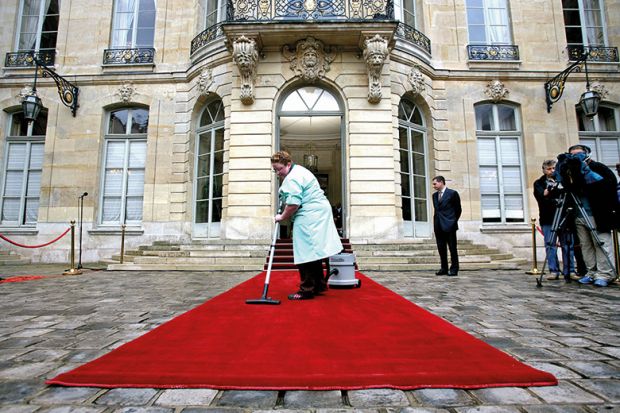Men are more likely to evade academic service tasks, such as organising seminars, supervising PhDs or participating in committees, while women feel obliged to take them on, a new study has found.
Margaretha Järvinen, of the University of Copenhagen, and Nanna Mik-Meyer, of Copenhagen Business School, surveyed 163 associate and full professors from the social science departments of three Danish universities, and found that female respondents completed more service work: of the full professors, 61 per cent of women were “high performers” compared with 27 per cent of men, while for associate professors, those figures stood at 37 per cent versus 11 per cent.
While previous studies have established this imbalance, Professor Järvinen said, “our aim was to investigate how these differences come about”. Writing in Current Sociology, the authors identify four forms of “relational work” to characterise how academics accept or decline service tasks: compliance, evasiveness, barter and investment.
The women they surveyed were more likely to demonstrate compliance, defined as “doing service work without reward”; this response was particularly common among female associate professors, described by two-thirds of this group in comparison with only a fifth of male associate professors. Among full professors, half of women exhibited compliance, compared with just under a quarter of men. Female respondents, the authors write, frequently expressed concern that “resistance – or even hesitation – when it comes to accepting service tasks would be a sign of incapacity or disloyalty”.
Campus resource collection: Gender equality in higher education: how to overcome key challenges
Men, on the other hand, were more likely to exhibit evasiveness, or “doing as little service work as possible”, and barter, defined as “exchanging service work with reward”. Male respondents more frequently described actively avoiding service work that did not relate to their own career goals – and doing so successfully. In comparison, multiple female respondents, the authors write, described situations in which they had tried to say no to service tasks “without this being accepted or respected by management”.
“A woman’s no is not respected to the same extent as a man’s and this seems to be related to institutionalised expectations tied to women and men,” Professor Järvinen said. “Women are to a higher degree expected to be organisational team-players while men to a higher degree are allowed to pursue their individual career interests.”
While both the women and men surveyed demonstrated the fourth type of relational work, investment – or “doing service work in the hope of a future reward” – their approaches differed. Women typically “invested” in service work, such as journal editorship or conference organisation, in the expectation of “rewards sometime in the future”, while men did so to “gain more immediate rewards”.
Men in academia, the authors write, are more likely to “feel they are entitled to select service functions” that are “enriching and rewarding”, and to turn down “time-consuming service that ‘leads nowhere’”.
While all the universities involved in the study mentioned academic service as an important factor in hiring or promotion considerations, Professor Järvinen said, these decisions were still mostly centred on research achievements.
“This discrepancy between official standards and actual assessments need to be solved,” she said. “Universities need to take the devaluation of service work seriously, not least because it is so clearly related to gender differences and obviously one of the reasons for women’s slower career progress compared to men’s.”
Register to continue
Why register?
- Registration is free and only takes a moment
- Once registered, you can read 3 articles a month
- Sign up for our newsletter
Subscribe
Or subscribe for unlimited access to:
- Unlimited access to news, views, insights & reviews
- Digital editions
- Digital access to THE’s university and college rankings analysis
Already registered or a current subscriber?








